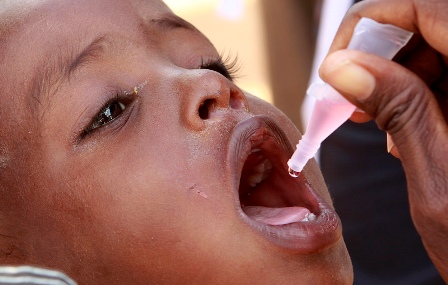
The trivalent oral polio vaccine has been instrumental in the near-eradication of the disease worldwide, but the vaccine still has some challenges that can be addressed by switching to a newer version. Starting this Sunday, the 155 countries that use the oral polio vaccine will move to the bivalent vaccine, the first time a changeover of this scale has been attempted.
The Global Polio Eradication Initiative (GPEI), a public-private partnership spearheaded by the WHO, is leading the charge. The project is set to conclude on May 1, leaving a two-week window for the world to simultaneously make the switch.
Accprding to GPEI, every country in the world currently using oral poliovirus vaccine (OPV) must withdraw the trivalent vaccine (tOPV) and replace it with the bivalent vaccine (bOPV). This will continue to protect infants from poliovirus types 1 and 3 while withdrawing the type 2 component, thereby mitigating the risk of seeding new type 2 circulating vaccine-derived poliovirus (cVDPV2).
GPEI says countries are alresdy demonstrating strong progress towards readiness for the switch.
“All 155 countries that use OPV have now developed switch plans and are putting the final preparations in place. Nearly 75% of the countries (112) have already received their shipments of bOPV, which are being distributed to peripheral storage location and service points. The GPEI have provided financial support to 67 countries to aid planning and implementation, 43 of are high risk and low income countries.”
The trivalent vaccine protects against poliovirus types 1, 2 and 3, but type 2 was declared eradicated in 1999. The advantages of cutting type 2 out of the vaccine are twofold: it reduces vaccine-associated polio and creates a stronger vaccine as it does not contain an extraneous component.
Sanofi ($SNY), Serum Institute of India, Bharat Biotech and GlaxoSmithKline ($GSK) are among the companies that manufacture WHO-prequalified trivalent polio vaccines. None of them will lose out in the switch, however, since every company that makes the trivalent vaccine also produces WHO-prequalified bivalent polio vaccines.
All oral polio vaccines are made with weakened live poliovirus, so there is a one-in-a-million risk of a weakened strain mutating and sickening people. However, according to the Global Polio Eradication Initiative, poliovirus type 2 is responsible for about 90% of paralysis cases caused by vaccine-associated polio. The switch will tamp down on the circulation of new strains of type 2 polio. Meanwhile, the Gates Foundation and the WHO are funding the development of a synthetic polio vaccine, which could eliminate the risk of vaccine-associated polio for good.
Despite the benefits of switching to the bivalent vaccine, there is a risk of declining population immunity to type 2 polio. The Global Polio Eradication Initiative has been scrambling to boost type 2 polio immunity levels ahead of the switch. It is also calling for a global stockpile of a monovalent vaccine against type 2 in case there is an outbreak of that polio type following the switch.
Source: FiercePharma/GPEI

